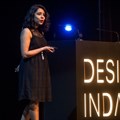#DesignIndaba2019: Wanuri Kahiu announced as speaker

As she said in an interview with the Daily Nation:
There are many ways of talking about our experiences as Africans, and if we lean on our traditions and beliefs as Africans, this will be one way of telling new stories about ourselves.African futurism
Her journey into the world of filmmaking started when she was 16 years old. Her parents were both conservatives – her mother a doctor and her father, a businessman. But she perhaps got her creative talents from her aunt, who is a famous actress in Kenya and her uncle, who is a sculptor. In an interview with Vogue Italia she said she was always creative and always used to create stories.
“I've always liked writing and reading. Those kinds of things were fascinating to me and later on, at 16, I decided to become a filmmaker, but in Kenya, it was illogical and unrealistic. So, my parents wanted me to get a science degree at the University of Warwick in the UK, but later on I earned my postgraduate in directing at the School of Film and Television at the University of California in Los Angeles.”
Imagination has no boundaries
Kahiu’s first feature film, From a Whisper, was based on the real-life events surrounding the twin bombings of the US Embassies in Nairobi and Dar es Salaam in 1998. The film won awards at the Africa Movie Academy Awards including Best Director and Best Picture, the Golden Dhow award at Zanzibar International Film Festival and was honoured with the 2010 Bafta/LA Festival Choice Prize.
But it was her second feature film that she wrote and directed, Rafiki, that made headlines worldwide, being praised overseas but criticised and attacked in her own country. The film that tells the story of two young women who fall in love was banned by the Kenya Film Classification Board (KFCB) for depicting homosexual scenes. Meanwhile, it was also selected to premiere at the 2018 Cannes Film Festival, the first Kenyan film to ever compete at the Festival.
We are made up of different types of people with different imaginations. There should be freedom to express these imaginations because imagination doesn’t have boundaries.Kahiu is optimistic that in years to come Kenyans will be confident enough to boldly hold such conversations.
What’s next? Well, to date she has written six films, a children’s book, The Wooden Camel, as well as a short story with science fiction writer Nnedi Okorafor that they are currently adapting for the screen.
Catch Kahiu at the 2019 Design Indaba where she will join a stellar selection of international speakers whose compelling presentations combine career-changing insights and the most cutting-edge work on the global circuit. Follow our Design Indaba special section for any updates on the 2019 Design Indaba, for which tickets are already on sale.
For more:
www.designindaba.com




























